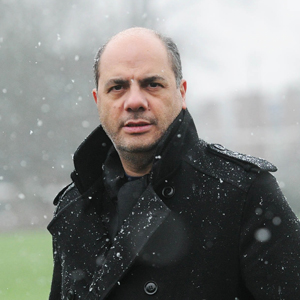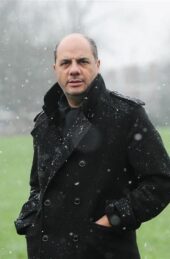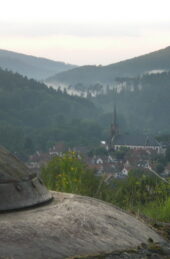Alex, this is the second novel in the series. What has happened since the end of Every Spy a Traitor and the beginning of The Second Traitor?
The most important thing which has happened is that the Second World War is now underway – the first book ends on the day Chamberlain announces we are at war with Germany. Aside from the odd flashback, this book begins in the autumn of 1939 and the main action – two thirds of the chapters – are set in 1940.
The Second Traitor is set in during 1940, a difficult year for Britain. What kind of research did you carry out to understand the country when the threat of invasion was very real?
All my novels are set against real historical events and my research in that respect is based around studying those events in as much detail as possible. In the case of The Second Traitor, the historical backbone of the book is the planned German invasion of Great Britain. This was the subject of a Hitler Directive in July 1940, though in truth the planning for Operation Sealion as it became known began much earlier than that. It is easy to underestimate the significance of the planned Nazi invasion: the Battle of Britain was closely related to it because the Kriegsmarine – the German navy – refused to countenance an invasion until the threat of RAF attacks on their convoys was eliminated. So, in a very real sense, the Battle of Britain was not just about protecting our skies, but our seas too.
I think Sealion is significant too because perhaps for the first time in the war, Hitler’s authority as a military strategist was questioned. Very few senior officers in Germany were confident about a plan to transport thousands of barges carrying around 100,000 troops and thousands of tanks and other vehicles across the North Sea and the Channel. There was a lot of relief in Germany when Sealion was allowed to fade away in the autumn of 1940.
I was very pleased to discover a real organisation which very few appear to have heard of called the Invasion Warning sub-Committee, which was based in the Old War Office Building in Whitehall (now a luxury hotel), so I was able have my main characters working for this organisation.
In terms of actual research, I spent an interesting week in Hamburg which is where the Abwehr – German Military Intelligence – based its espionage operation which was aimed at sending spies over to this country to gather intelligence to assist an invasion. Every one of these agents – all of whom were second-rate, poorly recruited and badly trained – was captured and either executed or turned into a double agent to work for the British. The actual building where the Abwehr was based – on General-Knochenhauer-Strasse –was also the German Army HQ for the area and still exists, unscathed from the war. It has recently been turned into luxury apartments. I did manage to get in, but let’s say that my visit didn’t last long.
My other main research trip for this book was to Rotterdam, which was going to be the main German base for the invasion of Great Britain. Rotterdam is an enormous port and was ideal for gathering barges from across Europe, converting them to take tanks, armour and equipment and store them until the invasion was ready.
While in Rotterdam I was particularly interested to visit Heemraadssingel – a very pretty road with a canal running through the middle of it and weeping willows on either side. On this road during the war was both the HQ of the German Navy and the Rotterdam Gestapo. Both feature in my book.
What is The Group?
The Group is a fictional organisation of British and Irish Nazi sympathisers, a fifth column operating within the UK to assist the Nazis in gathering intelligence. It is based on the fact that there were hundreds, if not thousands, of Nazi sympathisers, especially in the early stages of the war. The existence of these people is well-documented – I recommend Nazi Spies & Collaborators in Britain 1939-1945 by Neil Storey.
This raises an interesting question around opposition groups in the country. The Battle of Britain was still raging, and we assume the entire country was in full support of Winston Churchill. Was that the case?
Broadly speaking, I think it was – with the exception of a very small number of people like the ones mentioned above. There was of course political opposition in Parliament, but I think it would be a big mistake to suggest that Churchill lacked anything other than overwhelming support throughout the country. Worth mentioning, of course, that the British Communist Party did back the Nazi-Soviet Pact in 1939!
What prompted you to include an Irish element to the story?
Irish Republicans and the IRA in particular took the view that ‘my enemy’s enemy is my friend’. The British were the sworn enemy of the IRA, which was committed to an armed struggle to bring about a united Ireland. They felt that this could be achieved if the British mainland was invaded and occupied by the Germans who they hoped would then allow a united Ireland, especially if the Republicans had been helpful to them. There may have been a good deal of wishful thinking here, but there’s no doubt that there were links between the IRA and the Nazis – their former Chief of Staff Seán Russell travelled to Germany to be trained in Hamburg as a Nazi agent and then sent back to Ireland to infiltrate the British mainland. Russell and another IRA member – Frank Ryan – were travelling on a U-boat when he died on the journey, most probably from a burst ulcer. Astonishingly, there’s a memorial to Russell in a Dublin park, even to this day.
‘Archie’, our Soviet spy and British traitor from the first novel remains a threat, but there is a new one on the scene, ‘Bertie’. Is this spy ring inspired by the Cambridge spies?
Only in the sense that they’re traitors – especially Archie, Bertie’s is a more complicated situation. I’ve not consciously tried to copy the story of the Cambridge spies who, in any case, were more of a spy ring, which is not the case here.
Is there anything about espionage during this period that we’d recognise today?
Only that human intelligence and the intuition with which intelligence officers need to operate is still very important, even at a time when technology would sometimes seem to have become more important.
When during the Second World War will you set the third novel?
It’s mostly set in 1945 as the war draws to a close. The main ‘action’ takes place in northern Italy (in the first part of the book) and then in Berlin where the race to the German capital is won by the Red Army but the British know they need to have a presence in the city as they anticipate what became the Cold War. The final book in the series will cover the start of the Cold War in Berlin.
You’ve written many bestselling novels now. Do you have a favourite?
The Second Traitor is my 13th book so that’s a hard question – I have to say I’m pleased with all of them: there’s not one which I look back on now and think I wish I’d not written it like that. The Best of Our Spies – my first novel – has sold over 150,000 copies and been optioned for the screen too, so I’d have to say that one probably.
Have you planned your next series?
Only that I’m not sure I want to write another four-book series again – keeping key plotlines and key characters going through four books while at the same time keeping the books fresh and engaging in themselves, is a big strain. I appreciate how publishers like series but, personally, I’d like to do a one-off next, maybe with a possible follow up.

Alex Gerlis was a BBC journalist and is the author of The Second Traitor, the latest in The Double Agent series.
Oliver Webb-Carter is the Editor and Co-Founder of Aspects of History.






